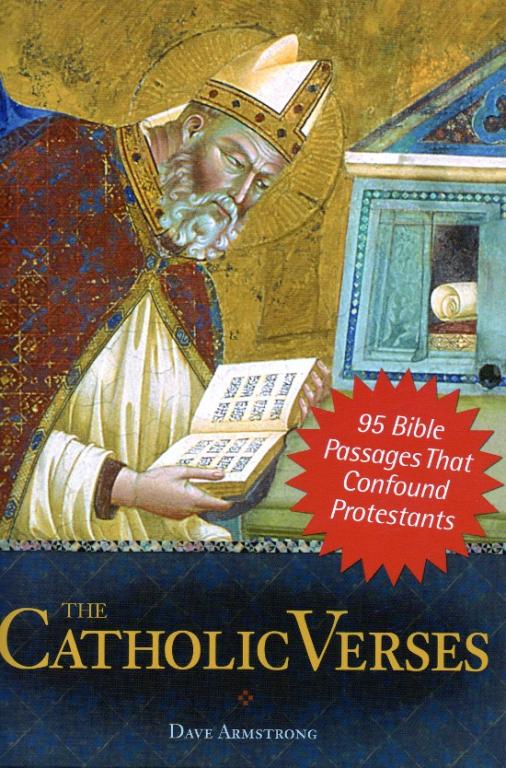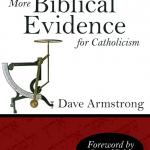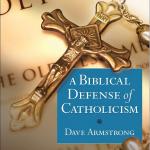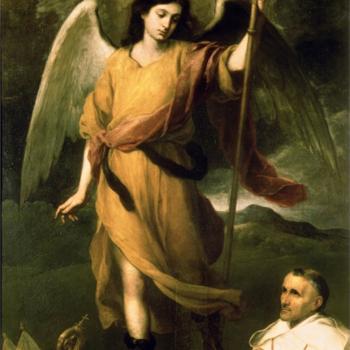
[see book and purchase information]
***
“Why Are Catholics So Deficient in Bible-Reading?” was published at National Catholic Register on 11-22-17. I’ve received quite a number of critical comments in the combox underneath the article (along with others in agreement). This is my response to many of those. The comments will be in blue. The article would appear to be, overall, a popular one based on the number of Facebook shares (1888 as of this writing).
***
C-Marie: Would love to know how old the author of this article is.
59.
Must have before his time when Catholics were wholly not encouraged to read the Bible due to possible misinterpretation.
Commenter “ace ” (on 11-26-17) noted what Pope St. Pius X (r. 1903-1914) wrote: “Nothing would please us more than to see our beloved children form the habit of reading the Gospels – not merely from time to time, but every day.” Then he added: “Biblical reading by all the faithful has been always been encouraged by the Church in the lifetime of all those currently alive and in ‘recent’ generations past.” So it was long before my time that the opposite was (or supposedly was) taught.
It actually took the Charismatic Renewal to get the reading of the Bible going, Bible studies, and more in Catholicism.
That may have played some role. Great, if so.
The reticence has nothing to do with kindergarten Christianity or laziness.
It often has to do with precisely that. Catholics are too often content to “coast” on the Bible readings once a week at Mass.
One place where encouragement to Catholics to read the Bible could occur is in articles just such as this one, if the author would use quotes from the Bible to demonstrate the use of Bible verses that a person could use in one’s prayer life.
That wasn’t the purpose of the article, which was simply to contend that Catholics ought to read the Bible more (not what particular parts of it they should read, or for what purpose). But I do have papers along those lines. For example, at Thanksgiving I collected biblical passages about thankfulness.
Graeme Reid: Up until the printing press, not even Catholics would have had personal copies of the Bible as they were hand written by monks in monasteries and passed down.
That’s quite correct. Gutenberg’s movable-type printing press was invented in 1439, so that has given Catholics 578 years to obtain a Bible and read it. I think we could have learned to at least match Protestant zeal in Bible-reading in all that time.
In this respect, it could perhaps be said that Catholics are in the same tradition now as they were for the many centuries before the printing press was invented.
I think that’s an insightful and plausible explanation, but if it’s true, it’s stupid on our part. As I said, we’ve had 578 years to realize that we can purchase a Bible and read it regularly on our own.
Of course reading the bible now is advantageous as long as it is interpreted correctly according to the original church that put it together, and authorised it, some centuries after Christ, under the power Christ gave to St Peter.
I spent three paragraphs commenting upon this in my article:
The nearly ubiquitous presence of various biases they bring to Scripture from the outset is why the Church’s guidance (in line with sacred tradition) is absolutely necessary. . . .
Catholics do better than evangelical Protestants in this respect, because they have more guidance, and hence, are less prone to various false interpretations and sectarianism deriving therefrom.
Catholics submit their theology as a whole to the Church and do not oppose their own theology to that of the apostolic tradition of the Church (itself completely in harmony with the Bible).
Peter Aiello: If “the Church’s guidance (in line with sacred tradition) is absolutely necessary”, why read the Bible for yourself? This creates a bias in reading it just as serious as Protestant biases.
Because Holy Mother Church highly encourages us to do exactly that. One must not confuse A) “the individual reading the Bible” with B) “the individual reading the Bible with no intent on being guided by anyone else, up to and including the one true Church. A and B are different. One can do A and be perfectly willing to be guided by the Church in other readings and studies, so as not to be possibly led into false doctrine. The individual Bible reading per se is not the problem. Rather, it is reading and making oneself the ultimate interpreter, over against Church and sacred tradition. Protestants, too, generally interpret the Bible at least within the parameters of their own denominational traditions, and in many cases, the broader Nicene tradition that includes Catholicism (in doctrines where virtually all Christians agree).
Why present preconditions to reading it?
Because the Bible itself suggests that it takes a lot of study to properly understand it, and as a result of the unfortunate history of multiple hundreds of contradictory Protestant denominations and heretical cults that have sprung up: all appealing to the “clear” teaching of Holy Scripture.
If the apostolic tradition is in complete harmony with the Bible, what’s the problem with reading it just to see what is in there? Sola Scriptura is better than nothing. You are getting Catholic teaching directly from the Bible.
Yes, it’s in there (I’ve always found that to be the case), but the Bible still has to be read within an interpretive framework. No one approaches the text as an “empty slate.” If I hadn’t been informed of many passages that suggest Catholic teaching, I wold have likely missed most of them.
Catholics don’t read the Bible for themselves because they assume that the Church is teaching them the real Christianity.
This is a false dichotomy. If one loves God, one desires to read His own inspired revelation, just as we desire to talk to and better know and understand persons whom we love.
I found important things in there that I wasn’t taught when I was growing up and going to Catholic school. I was surprised that they were in the Bible.
There is always more to be found and to learn in Holy Scripture. It’s infinite in wisdom and treasure.
Almost all older Catholics say that they were told to not read the Bible for themselves when they were young. Bible reading has not been a part of cultural Catholicism.
MorganB: I grew up in the 50s and 60s. The only mention of the Bible was an occasional homily referring to specific chapter and verse. The focus was almost exclusively on the catechism. My scary introduction to the Bible was when I attended a service at the St. James Methodist Church with my close friend and fellow musician.
That may be so, or it may be that they were told to “read it with the Church” (i.e., within the framework of Catholic tradition and orthodoxy). In any event, the Church has been expressly urging individual Bible reading since at least Pope Leo XIII (r. 1878-1903). Thus, every Catholic alive today has lived in the period where the Church in her magisterium was not discouraging such reading (whatever it may have taught before then, for various reasons).
jbg: Kinda funny when you hear that Protestants have more knowledge of Scripture than Catholics.
They have more knowledge of its particulars: the text of Scripture; what’s in it. They’re more familiar with its content. But this is a different thing from “knowledge” of correct doctrines. Hence, what I specifically stated in my article was: “Catholics don’t read the Bible anywhere near as much as evangelical Protestants do . . .” Per my title, the emphasis was on the sheer amount of reading, as in observing, “X reads the newspaper two hours a day, but his wife only looks at the headlines.” That makes no comment on what X got out of such reading; it’s only about the length of time that he spent reading the papers. Same here . . .
If protestants had more knowledge of Scripture then they would be Catholic.
Broadly, I agree. But they still would have to change their interpretive grid, as I and many other converts all had to do (never having “noticed” many passages that suggest Catholic teachings; let alone had them interpreted at length in a Catholic manner).
Memorizing the Bible does no good if you are getting it wrong.
I agree again. The Ethiopian eunuch was right:
Acts 8:30-31 (RSV) So Philip ran to him, and heard him reading Isaiah the prophet, and asked, “Do you understand what you are reading?” [31] And he said, “How can I, unless some one guides me?”
This was understood even in the old covenant:
Nehemiah 8:8 And they [the Levites] read from the book, from the law of God, clearly; and they gave the sense, so that the people understood the reading.
Patricia Haviland: I am a lifelong Catholic, but I have two sisters who rejected the Catholic faith and became evangelicals. They both have encyclopedic knowledge of the Bible which has inspired me to read the Bible more often. However, I have also noticed that they tend to use their knowledge as a prideful weapon, rather like a lawyer. They take pride in their ability to quote Scripture in an argument.
The problem with that Protestants with this “encyclopedic knowledge of the Bible” nevertheless tend to simply cite “pet” verses, while ignoring the many passages that go against their view. So what at first seems impressive is actually (almost always) highly selective, almost robotic citation. This is especially true (in my experience) of Calvinists, Baptists, and fundamentalists. If you talk about faith, out comes John 3:16, etc., like a mantra. But that’s only one of a hundred or more relevant passages. It seems to fit in well with faith alone, so they use it.
It takes a certain level of humility to bow to a higher authority in matters of the faith, and in that sense, I always want to be under the guidance of learned clergy.
Absolutely correct. I think this is the sort of thing that St. Peter alluded to:
2 Peter 3:15-16 . . . So also our beloved brother Paul wrote to you according to the wisdom given him, [16] speaking of this as he does in all his letters. There are some things in them hard to understand, which the ignorant and unstable twist to their own destruction, as they do the other scriptures.
Perhaps this train-yourself attitude is why there are so many Protestant denominations.
I think that has a lot to do with it. If Christians would look back to the common tradition of Christian teaching, passed-down in an unbroken chain from Jesus to 1517, then they would avoid many unnecessary divisions.
Everyone thinks that they are (or can be) an expert on all things GOD by memorizing verses. But all they really want to do is win arguments through memorization of the Bible.
More true observations! It’s not true of all Bible memorizers, of course, but of a good many, for sure. I know about the “arguments” part first-hand because I’ve engaged in well over a thousand individual debates (most still posted on my site) with Protestants for 27 years.
I would prefer to understand the meaning of Scripture than memorize it.
Very true. The Bible is not always self-evident simply upon reading, which memorization largely presupposes.
ace: Ah, you should have at least started with Pope Leo XIII: . . .
I cited his 1893 encyclical Providentissimus Deus (On the Study of Holy Scripture), in my article for This Rock (now, Catholic Answers Magazine), entitled, “Catholics Need to Read Their Bibles” (2-1-04). I cited it at much greater length in my website article, “Why Don’t Catholics Read the Bible More Than They Do?” (6-26-02). Here is that full citation:
[T]here are not a few Catholics, men of talent and learning, who do devote themselves with ardor to the defence of the sacred writings and making them better known and understood . . . We cannot but earnestly exhort others also, from whose skill and piety and learning we have a right to expect good results, to give themselves to the same praiseworthy work, It is our wish and fervent desire to see an increase in the number of the approved and persevering laborers for the cause of Holy Scripture . . .
Let all, therefore, especially the novices of the ecclesiastical army, understand how deeply the sacred books should be esteemed, and with what eagerness and reverence they should approach this great arsenal of heavenly arms . . . As St. Jerome says, ‘to be ignorant of the Scripture is not to know Christ’ [In Isaiam, Prol.] . . . ‘A man who is well grounded in the testimonies of the Scripture is the bulwark of the Church.’ [Ibid., 54:12] . . .
. . . the Church by no means prevents or retrains the pursuit of biblical science, but rather protects it from error, and largely assists its real progress. A wide field is still left open to the private student, in which his hermeneutical skill may display itself with signal effect and to the advantage of the Church . . . such labors may, in the benignant providence of God, prepare for and bring to maturity the judgment of the Church; on the other, in passages already defined the private student may do work equally valuable, either by setting them forth more clearly to the flock and more skillfully to scholars, or by defending them more powerfully from hostile attack . . .
. . . the studies of non-Catholics, used with prudence, may sometimes be of use to the Catholic student . . .
***













